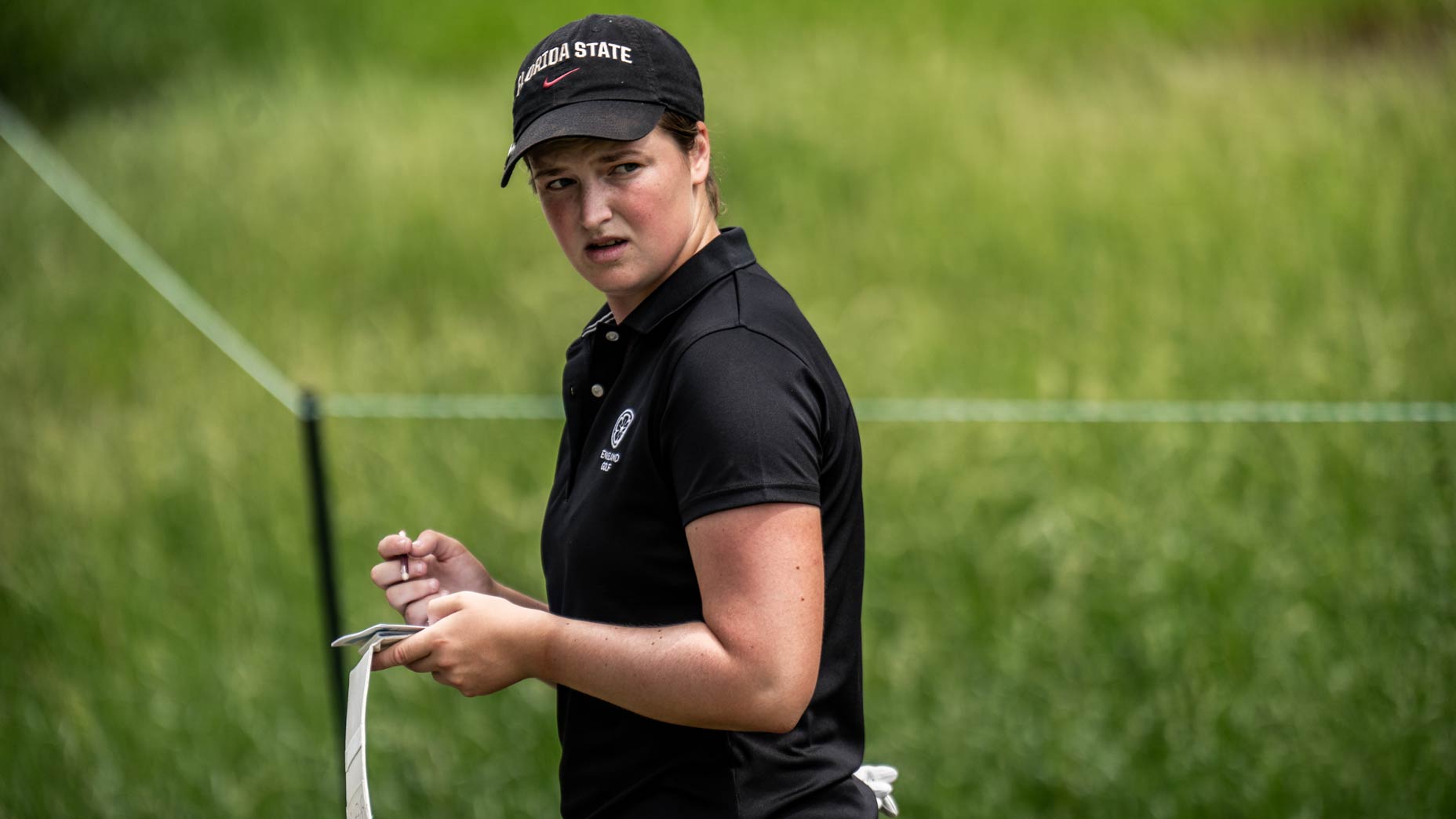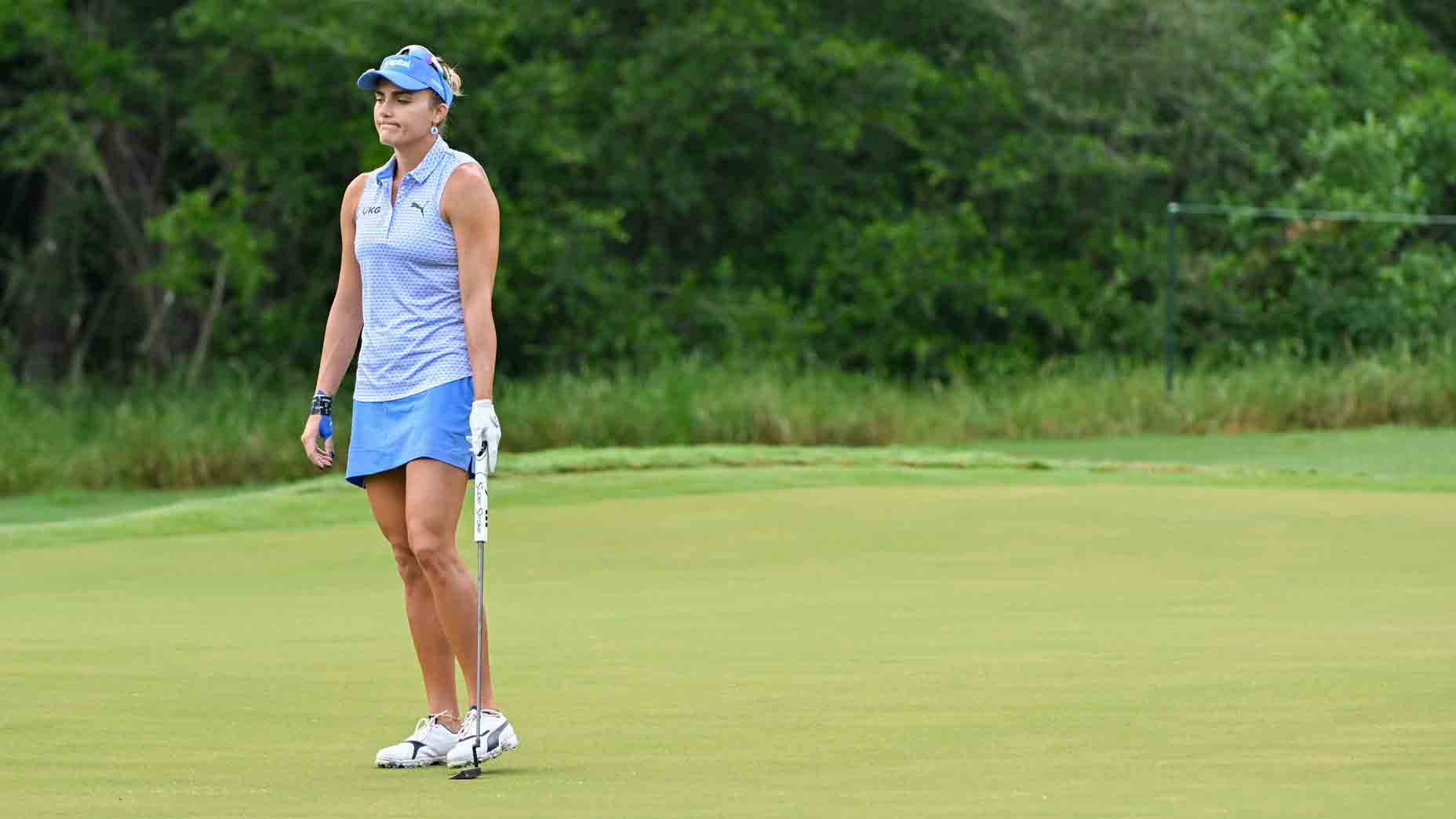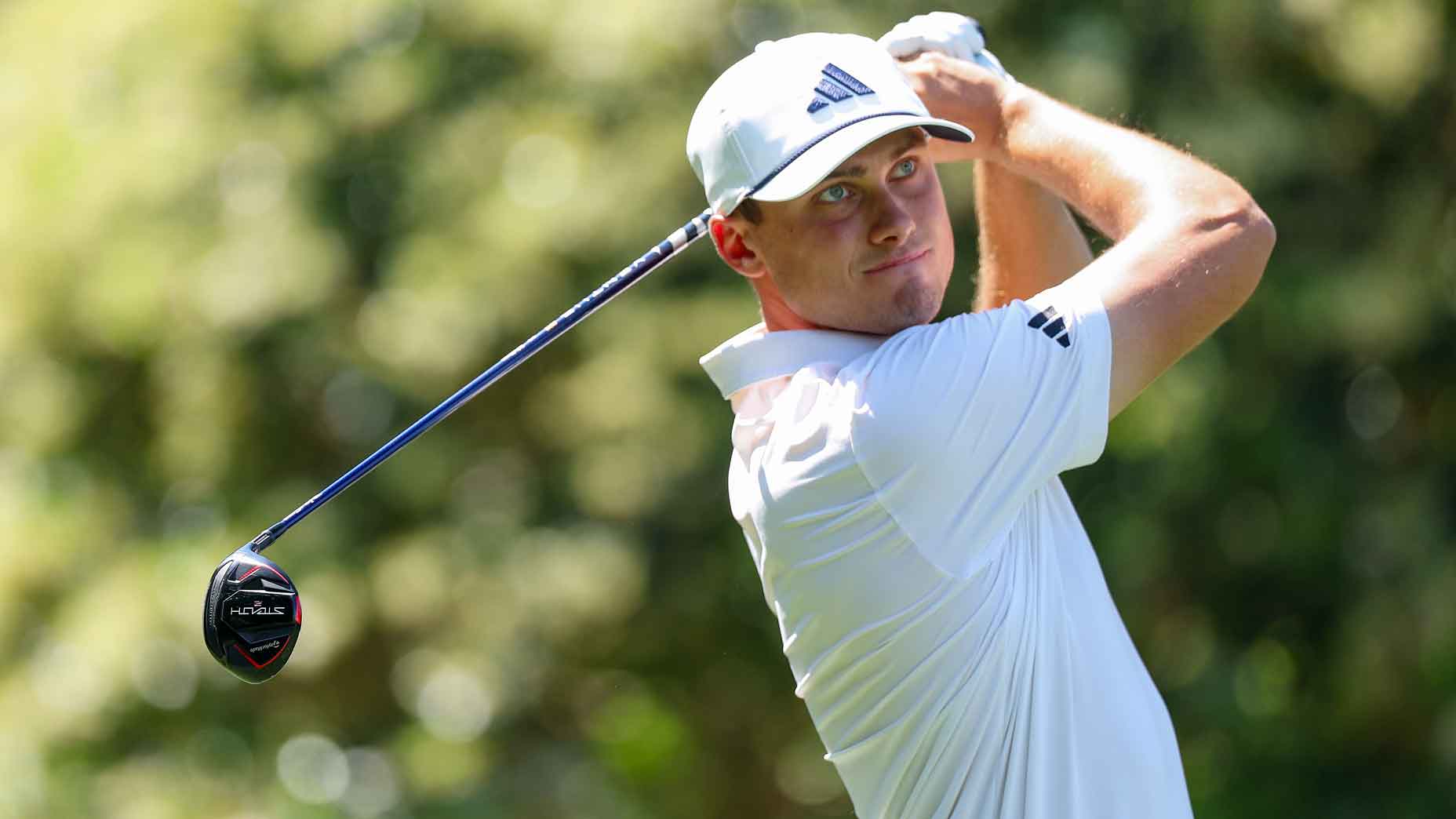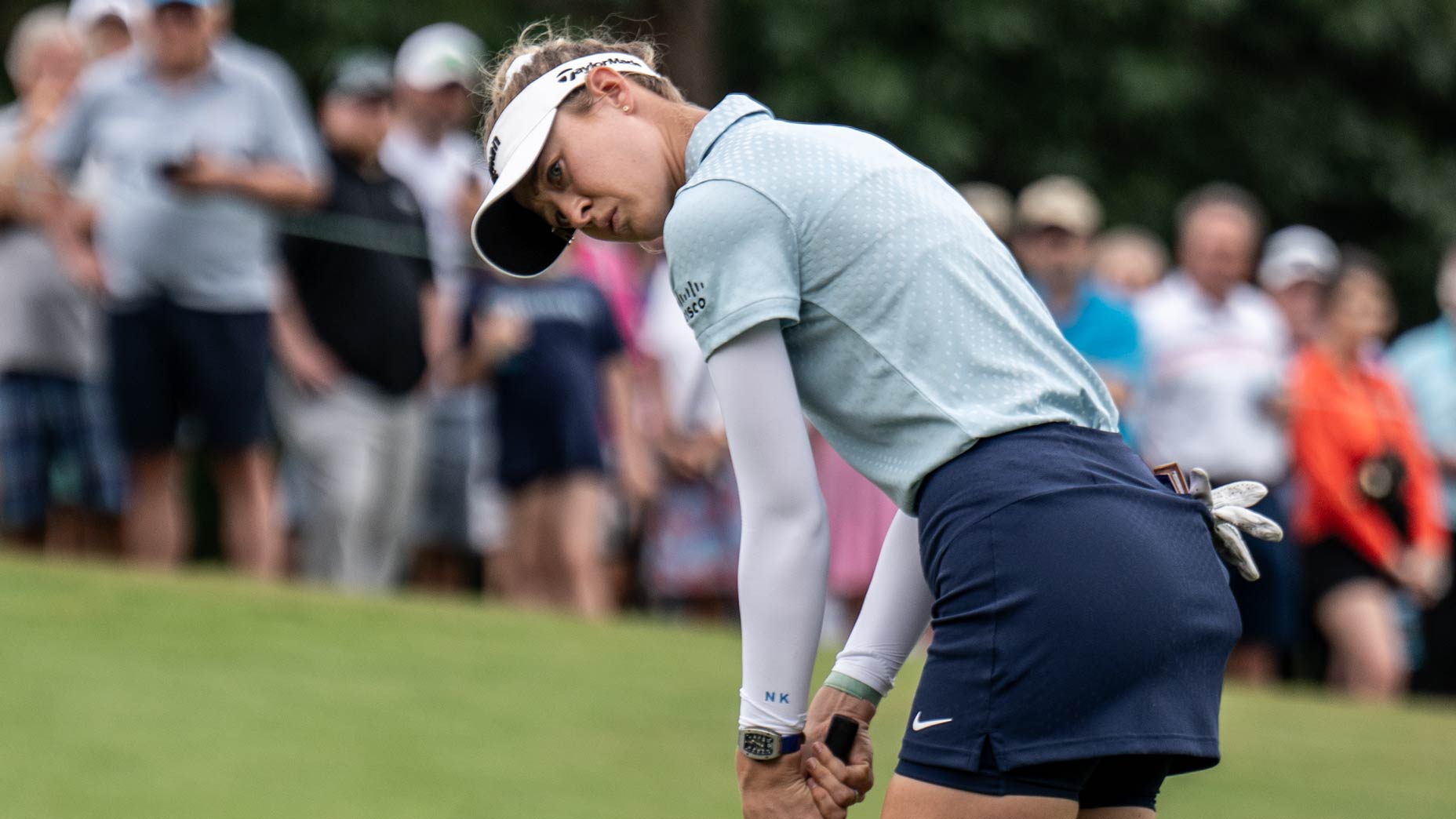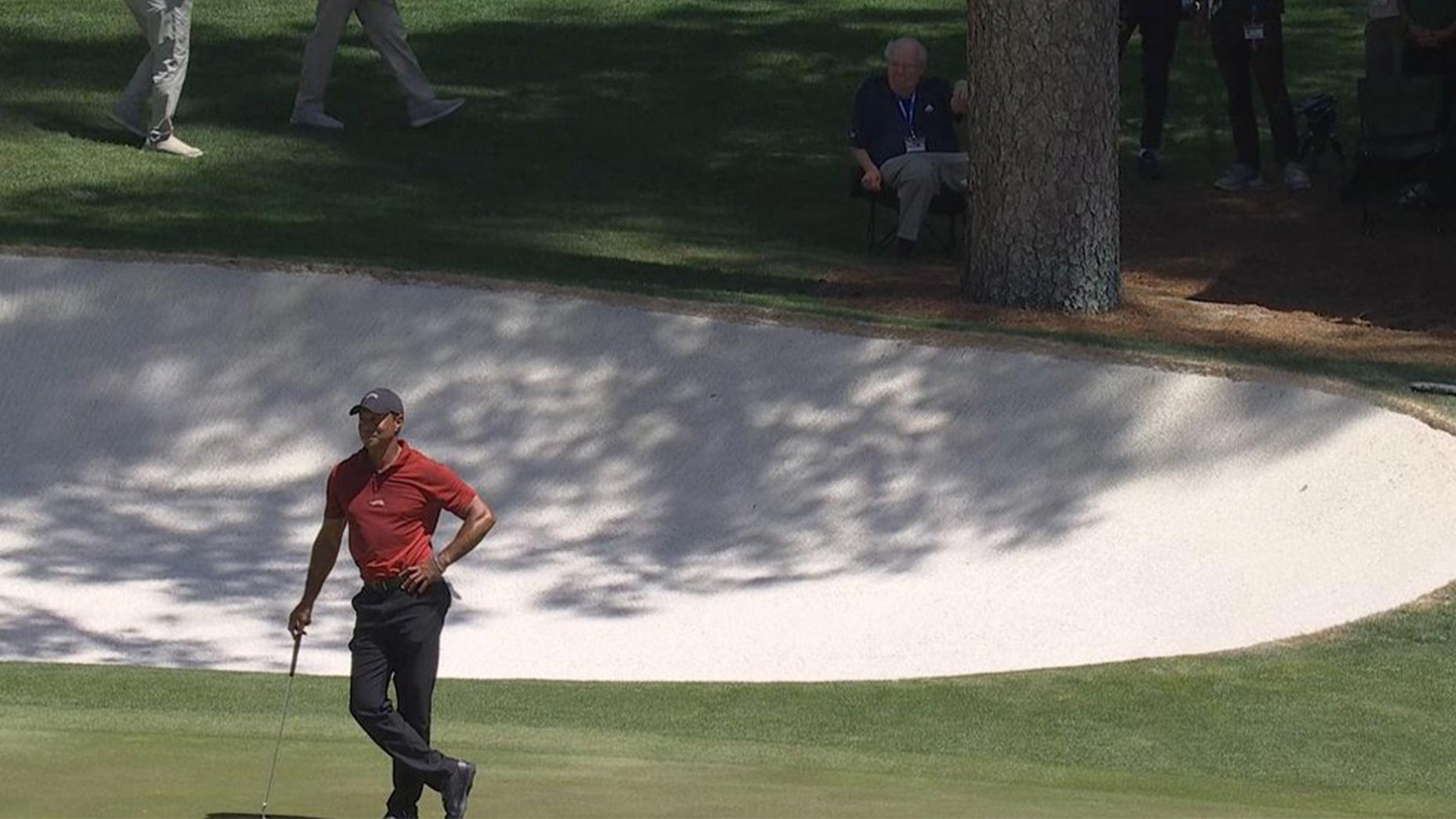Exclusive excerpt from Tiger Woods by Jeff Benedict and Armen Keteyian. Published by arrangement with Simon & Schuster, Inc. Copyright © 2018 by Jeff Benedict & Associates, LLC and Lights Out Productions, LLC.
The Tiger Woods who returns to Augusta National this month appears to be at peace with himself, a legend past his prime — perhaps — but one with no-quit ferocity. Tiger the fighter showed up at the 2010 Masters, too, when almost every aspect of his life was in disarray. That spring, he emerged from ravaging scandal to mount one of the most astonishing comebacks in a career full of them. In this excerpt from Tiger Woods, their searing new biography of golf’s most blazing talent, Jeff Benedict and Armen Keteyian tell the story of how Tiger roared back — at his doubters and closest allies, and on the only stage that has ever mattered to him: the course.
The house no longer felt like a home. His wife, Elin, and their children were living elsewhere. Butcher paper covered the windows, preventing anyone — especially tabloid photographers — from seeing inside. Self-help books littered the kitchen counter. It had been nearly four months since the scandal that ruptured Tiger Woods’ life first broke in the National Enquirer the day before Thanksgiving in 2009, and a month since he’d completed in-patient treatment for sex addiction. Now his days consisted of laying low. He was exercising on his own, hitting golf balls by himself, getting most of his meals from the clubhouse at Isleworth — the gated community outside Orlando where he and his once picture-perfect family had, until recently, resided — and going to bed early. He was in marriage counseling. He was also meditating on a daily basis, an attempt to reconnect with his Buddhist roots and get himself in the right mind-frame to work through a very difficult reconciliation process with Elin. I need to do these things, he told himself.

For so many years, Tiger always had IMG, Nike and his agent Mark Steinberg to take care of everything for him. They told him where he needed to be and they made sure he got there. In the timeslots that weren’t spoken for, Tiger was free to plan and indulge in his clandestine affairs with women. The scenario was both an addict’s dream and a recipe for disaster. After years of lying to others and lying to himself, he emerged from treatment — at age 35 — a changed man, more committed to being honest with himself and the people around him. But he faced a totally unfamiliar situation — for the first time in his life, his time was all his own. He had no tournaments to play in, no commercials to shoot, no appearances to make. His indefinite break from the game was intended to give him time and space to get a firm grip on his addiction, regain control of his personal life and try to salvage his marriage.
Tiger was trying, but he was living in a constant state of shame. Although he wasn’t particularly religious, he viewed his infidelity and the lies he had told to conceal it as “personal sins.” In an attempt to seek redemption, he had confessed to those he had loved most. There was a certain liberating aspect to those grueling private conversations. Conversely, public confessions about personal sins were demoralizing. Even after making his mortifying public apology at Tour headquarters, Tiger was still dogged by journalists in search of skeletons from his past, a past, it was becoming increasingly clear, he would never escape.
* * * * *
For the length of his pro career, Tiger had remained aloof on the PGA Tour, an almost mystical presence, distancing himself from players, fans and the golf press. The time off from the sport had changed his perspective and helped him realize how much he missed what he had always taken for granted. He also missed the competition. In mid-February 2010, immediately after finishing rehab, he started hitting balls again. Then in early March he resumed working on his game with his coach Hank Haney.
Tiger had spent six years with Haney. During that period he played in 93 PGA tournaments and won 31 times, including six majors. It was a remarkable run, where Tiger won 33 percent of the time. By comparison, in a little over seven years under Butch Harmon, Tiger won nearly 27 percent of the time, winning 34 of the 127 PGA tournaments he entered, including eight majors. Woods and Harmon spent more years together, resulting in more majors. But Woods and Haney had a success rate that was unparalleled in the annals of golf. In that time, he had come to trust Haney more than almost anyone else in his life outside of his family and Mark Steinberg.
[tile:14103917]
Being on the range with Haney felt like old times — exactly the feeling Tiger was looking for. It made the decision easy. Forget the hiatus. Tiger was returning to the PGA Tour.
On March 16, 2010, he issued a statement announcing he was playing in the Masters the following month. “The Masters is where I won my first major and I view this tournament with great respect,” he said. “After a long and necessary time away from the game, I feel like I’m ready to start my season at Augusta.”
Haney was surprised by the announcement and immediately thought Tiger was coming back way too soon. They had only practiced together for a week prior to deciding to play in the Masters. Tiger was still spraying the ball all over the place. His game was a long way from being tournament ready. Besides being rusty, Tiger looked lost on the golf course, like a man weighted down with the worries of the world.
In Haney’s mind, Tiger was setting himself up for failure. Augusta, after all, was the ultimate stage and the spotlight on him would be brighter than ever. Sean McManus, the president of CBS News and Sports, had predicted that Tiger’s return to professional golf after the scandal would be the biggest media event in the past ten to fifteen years outside of Barack Obama’s inauguration.
But Tiger’s mind was made up. No one knew what it was like to be in his shoes. His life was in ruins, his messy past complicating and dictating his future. The one surefire place where he could establish some normalcy and do something that he felt good about was inside the ropes, even at the risk of alienating Elin, who wanted him to take a much longer hiatus from the game. There, over the course of four days and 72 holes, the rules would be different. In golf, the past is the last hole; the present is the current shot you face; and the future is the one after that. Eager to get back to his comfort zone, Tiger summoned Steve Williams, his steadfast caddie of 11 years, to Isleworth. It was time to get ready to go to Augusta.
When Williams arrived at Tiger’s home on April 3, he had a lot to get off his chest. After the scandal broke, Williams had repeatedly asked Team Tiger to release a statement clearing him of any involvement. Instead he got the silent treatment. Then one mistress, cashing in on her five minutes of fame, insisted she had met both Williams and Tiger in Vegas, creating the inference that Williams had known about Tiger’s adultery and covered it up. This unsubstantiated rumor spun itself into news in Williams’ native New Zealand and soon splashed around the world. In rehab, Woods had finally communicated with Williams in the form of an e-mail, apologizing for his actions. Later, he called Williams’ wife, Kirsty, in an effort to smooth things over at home. But it was too little too late. Kirsty had long considered Elin one of her best friends, and she wasn’t persuaded by Tiger’s words. Meantime, doubts lingered about how much Steve knew. The bottom line was that Tiger’s infidelity had damaged Williams’ reputation in New Zealand and put a strain on his marriage.

Tiger was well aware that he had disappointed Williams. He also knew that it was on him to clear the air with his longtime caddie. But when Williams entered his home, Tiger was preoccupied. After a less than enthusiastic greeting, Tiger said they would talk later. In the meantime, he insisted he had to run out.
This didn’t sit well with Williams. He had a long list of grievances that he wanted to air, and he’d been assured by Steinberg that Tiger would have a face-to-face conversation with him once he got to his house. Frustrated, Williams was in a foul mood hours later when he and Haney joined Tiger for a practice round at Isleworth. “I don’t even know why we’re going to Augusta,” Williams told Haney. “He can’t make the cut hitting it like this. It’s horrible.”
Haney didn’t disagree. But he also realized that Tiger’s mind was made up. So on the 18th fairway, he pleaded with Tiger to at least modify his swing path, sacrificing some distance off the tee in hopes of minimizing the degree in which his shots were going off-line. “Tiger,” he told him, “you have no chance the way you’re swinging.”
Tiger finally made peace with Williams the next day on the way to the airport. Behind the wheel and wearing a pair of wraparound shades, Tiger never took his eyes off the road as Williams vented, telling Tiger that his actions had put him and his family in a difficult position and that he was going to have to earn back his respect. It was pretty clear that Williams didn’t feel appreciated after all of the years of loyalty and service he had shown. Going forward, Williams said he wanted three things from Tiger: some verbal communication of appreciation, a pay raise and an apology.
The request for a salary increase bugged Woods. But he considered Williams a great friend, someone who had remained loyal to him through a very rough patch. Plus, he needed Steve back on the bag and he didn’t want any more friction between them. While Tiger mended fences with Williams, he had more pressing matters to worry about. Tiger had to gear up for his first press conference since the infamous car crash that had catalyzed the scandal. Scheduled to take questions from the press at Augusta, he was dreading it. Writers from around the world would be in attendance, and they weren’t coming to ask him about golf.
* * * * *
Basketball fans embraced Kobe Bryant when he led the Lakers to an NBA championship after being accused of rape. Football fans welcomed back Michael Vick when he turned in the best season of his career after serving twenty-one months in federal prison for his role in a dog-fighting ring. Mark Steinberg believed that golf fans would forgive and forget Tiger’s indiscretions, too. The key, he told Tiger, was to perform well.
The discussion about Bryant and Vick took place inside Tiger’s rental home in Augusta, where Woods huddled with Steinberg to prepare for his press conference. Tiger fielded hypothetical questions and worked on his responses. Then, at 2:00 p.m. on the Monday before the start of the Masters, he entered the jam-packed press room at Augusta National and took a seat beside Craig Heatley, the chairman of the Masters Media Committee.
“Ladies and gentlemen, good afternoon and a very warm welcome to you all,” Heatley began. “I would also like to welcome Tiger Woods, our four-time Masters Champion. Tiger, we are delighted to have you here with us.”
Going in, Tiger didn’t know what to expect. But as he looked around, he suddenly felt at home. He knew the room like the back of his hand. So many of the faces were familiar. In therapy he learned a new phrase: “Are you open?” Tiger faced the throng of reporters and decided to be more open than he’d ever been with them.
“What I’ve done over the past years has been just terrible to my family,” Tiger said. “And the fact that I won golf tournaments I think is irrelevant. It’s the pain and the damage that I’ve caused, you know, my wife, my mom, my wife’s family. My kids, going forward, are going to have to…. I’m going to have to explain all of this to them.”
This was better theater than golf or anything else on television in the middle of the day on a Monday. The networks cut into regularly scheduled programs to carry the press conference live. It also aired live on the Fox News Channel, CNN, ESPN and a variety of other cable stations, and streamed live around the world. With no prepared statement or notes, Tiger spoke from the heart, then took a barrage of questions about sensitive personal matters that would have been unthinkable to bring up prior to the scandal: performance-enhancing drugs; his relationship with recently arrested sports-medicine guru Anthony Galea; Vicodin; Ambien; the state of his marriage; the police report detailing his car crash; his affairs; and the nature of his in-patient treatment.

Woods refused to say the words “sex addiction” and he politely declined to answer one question: What was he in treatment for? “That’s personal, thank you,” he said. But he dealt with everything else head-on, stating:
— He had never used performance-enhancing drugs and he had only received PRP treatment from Galea.
— He had been contacted by federal authorities who were conducting a criminal investigation into Galea, and he was cooperating fully.
— He used Vicodin and Ambien, but he had not undergone treatment for addiction to either one.
— Rehab was brutal; his treatment was ongoing; Elin would not be attending the Masters, and he was doing everything possible to hold onto his family.
“What’s been the most difficult thing for you to deal with?” a reporter asked toward the end.
“Having to look at myself in a light that I never wanted to look at myself in,” Tiger said. He pledged to tone down his angry outbursts when things didn’t go his way on the course, and to show more appreciation to fans. “I need to be a better man,” he said.
This was Tiger 2.0. Uncharacteristically forthcoming. Contrite. Remorseful. The greatest athlete in the world never looked so vulnerable, so human. Steinberg, Haney and Williams couldn’t help wondering how all of this would effect Tiger’s play. Intimidation — the steely glare, the cold demeanor, the machine-like approach — had always been one of his best weapons. Would the reformed Tiger still have his competitive edge?
Tiger was more worried about how he would be received by the fans. Would they give him dirty looks? Heckle him? Or just gawk at him? Large crowds gathered to watch him play a practice round, following him from hole to hole, cheering him on and offering words of encouragement. The warm reception seemed to influence his play. Haney saw a noticeable uptick in the quality of Tiger’s swing and his focus. Even Williams felt the positive energy. The fans were clearly behind Tiger. For the first time in a long time he was smiling. Augusta felt like a refuge.
Or so it seemed.
* * * * *
After serving as the president and CEO of the Atlanta Committee for the 1996 Olympic Games, Billy Payne was named chairman of Augusta National Golf Club in 2006. One of his duties was to deliver an annual address on the eve of the Masters. It was a long-standing tradition, affording the head of America’s most prestigious golf club to weigh in on the state of the game. But when Payne faced the golf writers on the day before the start of the 2010 Masters, he went off script and publicly scolded Tiger.
“He forgot in the process to remember that with fame and fortune comes responsibility, not invisibility,” Payne said. “It is not simply the degree of his conduct that is so egregious here; it is the fact that he disappointed all of us and more importantly, our kids and our grandkids. Our hero did not live up to the expectations of the role model we saw for our children.”
It was one thing for pundits, newspaper columnists and talk show hosts to pontificate about Tiger’s misdeeds. That sort of thing happened so routinely that Tiger was practically numb to it. But to have the head of Augusta publicly chastise the No. 1 player in the world on the eve of the most prestigious tournament on the PGA Tour was stunning. Payne spoke for the entire membership at Augusta, and he didn’t hesitate to lecture Woods about his future.
“Is there a way forward?” he said. “I hope yes. I think yes. But certainly his future will never again be measured only by his performance against par, but measured by the sincerity of his efforts to change. I hope now he realizes that every kid he passes on the course wants his swing, but would settle for his smile.”
Payne had never previously commented on a golfer’s behavior off the course. Nor had his predecessor. It simply wasn’t done.
Normally, no one outside of the golf press paid much attention to the chairman’s state of the union address. But word of Payne’s rebuke of Tiger instantly became a national story. Even the foreign press covered it.
Tiger heard about Payne’s comments while he was at the course. Asked what he thought of Payne’s insistence that he had disappointed everyone, Tiger took it in stride. “I disappointed myself,” he said, leaving it at that.
It hurt to hear that he had let children down and failed to live up to expectations. Tiger didn’t exactly need to be reminded. But even in private he didn’t feel like talking about it.
“Man, how about Billy Payne?” Haney said on the car ride back to the house.
“Yeah,” Tiger said.
* * * * *
Earl Woods had been dead for nearly four years as Tiger geared up at Augusta in 2010. He used to tell his son that no man he ever faced would be mentally stronger than him, and Earl made sure of it, using coaching techniques that were not designed for a young boy. Insulting him — “motherf—er.” Breaking him down — “You little piece of s—.” Pushing him to the edge — “little ni–er.” In an attempt to toughen up his son, Earl treated him like a soldier in boot camp. But he was right about the end result. No golfer in the history of the PGA Tour matched the sheer willpower of Tiger Woods. Never was that more apparent than at the start of the opening round of the Masters on April 8.

A sea of humanity jammed the area surrounding the first tee. Patrons packed the grounds all the way back to the clubhouse. Inside, Tiger waited. The crowds had been nice to him in the practice rounds. But what would they think of him now? Suddenly, the door opened and Tiger emerged. Anxious but determined, he looked straight ahead and walked into a human tunnel of people who were close enough to touch him. The sound of clapping and cheers rippled from the clubhouse to the tee and down the fairway. “Tiger!” “Welcome back!” “We’re with you.”
Instead of blocking out the crowd as he’d done his whole career, he smiled widely and nodded as he worked to keep his emotions in check. After months of being beaten up and beating himself up, he was somewhere he was accepted, among people who loved him for his talent. Then the place went dead silent as Tiger stood over his ball, preparing to take his first competitive swing in 144 days. Everyone — the writers, the other golfers, the television executives at CBS and the other networks that broadcast golf, founder Phil Knight and the folks at Nike, the millions watching from home and the thousands of fans hovering around him — was wondering the same thing: After such a precipitous fall from grace, can Tiger Woods still generate the magic?
The silence was broken by the whipping sound of his driver and the sonic boom of his clubhead colliding with the ball. His ball soared straight and true, finally dropping down in the center of the fairway. It was a perfect shot that launched a cascade of cheers. He was back.
Pleased, Tiger handed his club to Williams and the two of them started down the fairway, propelled by the applause of the gallery. Overhead, a low-flying plane pulled a banner that read TIGER: DID YOU MEAN BOOTYISM? Even his immersion in Buddhism was fair game for mocking. But Tiger could take the heat — he always could — as long as he was competing. As he hammered tee shots and sank putts through his opening round, Nike aired a jarring new commercial that featured Tiger somberly staring into a camera as if facing his father. Like a voice from beyond the grave, Earl speaks to him: “Tiger, I am more prone to be more inquisitive…to promote discussion. I want to find out what your thinking was. I want to find out what your feelings are. And did you learn anything?” The camera zoomed in on Tiger’s eyes as the screen faded to black and the Nike swoosh appeared.
For a man who craved privacy, his sins were on full display and his road to redemption would be trudged under the weight of public spectacle. “My regret will last a lifetime,” Tiger later wrote.
Yet amidst all of the swirl, Tiger shot a scintillating 68 on the first day, the lowest he had ever shot in the opening round of the Masters. He followed that up with a 70 in round two, leaving him just two shots behind the leader heading into the weekend. Through the first two rounds he had smiled more at fans, hugged fellow golfers and slapped the hand of his caddie more than in his previous sixteen Masters tournaments combined.
Williams welcomed Tiger’s sunny disposition. But as he walked with Tiger and Steinberg from the media center after the second round, he listened as Steinberg told Tiger that if he wanted to win he had to “stop being a nice guy” and go back to the old Tiger. “I couldn’t believe my ears,” Williams later recalled. “After all that Tiger had been through, and the fact he had made a public commitment to be a less snarling and aggressive Tiger…his main advisor was telling him the opposite.”
It was a turning point for Williams. He had been looking at the Masters as a proving ground for Woods, a chance to demonstrate that he could be more tolerant, more appreciative and less hostile. Suddenly, it felt like Tiger was being encouraged to scrap that. “Right then,” Williams later wrote, “something inside me changed. A brick in the foundation of my relationship with Tiger had been pried loose.”
Twenty-four hours later, Haney had an eerie premonition: This will be the last time I ever work for Tiger Woods. The feeling came after Tiger shot 70 again on Saturday, leaving him just three shots behind Phil Mickelson and four shots behind the leader, Lee Westwood. Astonishingly, after everything that had happened, with one round to go Tiger was well within striking distance. He was right near the top of the leaderboard and in position to win his fifth Masters. Yet he was fuming as he made his way to the practice range afterward.
“I hit it like s—,” he complained.
On the contrary, Tiger had hit fifteen of eighteen greens on Saturday. He was playing superbly. But when Haney tried to boost him up, Tiger lashed out. The bottom line was that he had lost ground to Mickelson and Westwood. And Tiger blamed his predicament on his swing, which came across like he was pissed at Haney.

The next day, Tiger showed up for the final round in a foul mood. His marriage was imploding. The tabloids and late-night comedians were pillorying him again. And f—ing Mickelson was playing like he didn’t have a care in the world.
During warm-ups, Haney watched in silence as Tiger hit one low shot after another. He looked defeated. Finally, Haney stepped in. “You just have to get the ball up in the air,” Haney told him. It was a familiar phrase between them, one that Haney had used for years whenever he wanted Tiger to open his clubface to increase the trajectory upon impact. Tiger always responded affirmatively to the instruction. But this time he looked at Haney and said: “What do you mean by that?” Then he resumed hitting low. It was as if he wasn’t trying.
In that instant, something snapped inside Haney. The job no longer seemed worth it. Emotionally, he felt exhausted. Steinberg had told him more than once that Tiger considered Hank one of his best friends. But it didn’t feel that way. Even after treatment, Tiger didn’t seem capable of the reciprocal treatment that Haney was extending to him. As Woods hit some final putts and started to head toward the first tee, Haney stepped toward him.
“You know what we talked about. Do that, and you’ll be all right.”
Tiger nodded.
“Good luck,” Haney said.
Those were the last words that Tiger ever heard from Haney on a golf course as his coach.
* * * * *
Tiger eagled two holes in the final round. But Mickelson parred his first seven holes and pulled away from the field to win his third Masters. Tiger finished five shots back, tied for fourth.
“Good job!” Williams told him as they exited the 18th green to the cheers of the gallery. “Good job!”
It was more than a good job. Only three players in the world had played better. None of them was trying to concentrate while the world crashed down around him. Williams was truly impressed. But Tiger had his life to get back to. He was in no mood to talk to anyone. He wasn’t going to congratulate Phil. He wasn’t going to thank people. He didn’t have anything to say to Haney. Elin wasn’t around. Steinberg’s phone rang. It was Haney.
“Mark, I’m finished,” he told him. “I’ve had enough.”
“Hank, you can’t do this,” Steinberg said. “You can’t do this to him. This is the toughest time of his life.”
Haney just listened.
“You understand him,” Steinberg pleaded. “He needs you. Whatever you do, don’t abandon him now.”
Tiger Woods by Jeff Benedict and Armen Keteyian was released March 27. You can order a copy here.


